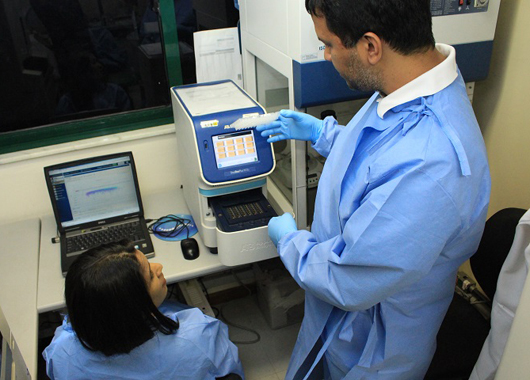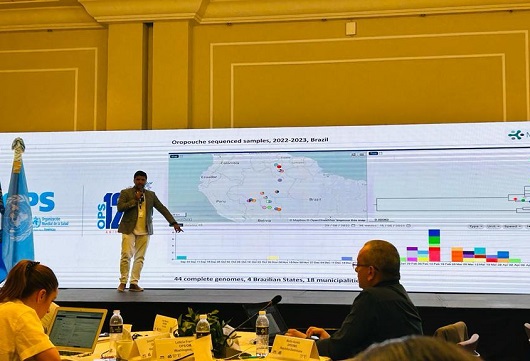Fiocruz becomes a reference in Oropouche virus detection protocol
04/09/2023
Júlio Pedrosa (Fiocruz Amazônia)
Developed at the Leônidas & Maria Deane Institute (Fiocruz Amazônia), the real-time PCR diagnostic protocol for detecting Oropouche virus will be used by eight Brazilian public laboratories and, in the future, in other American countries. Oropouche is an arbovirus that causes symptoms similar to dengue, and the decision to use the protocol was taken by the General Coordination of Public Health Laboratories (CGLAB) of the Brazilian Ministry of Health (MS), as part of the surveillance strategy for emerging viruses on the continent. The adoption of the trial aims to expand the diagnostic supply to prevent the occurrence of diseases with the potential to become epidemics or pandemics.
According to the CGLAB/MS, in Brazil, the laboratories in the states were selected according to the epidemiological scenario. It is expected that, by 2024, all states in the country will be carrying out the diagnosis. The eight laboratories are the Central Public Health Laboratories (Lacens) of Acre (AC), Amazonas (AM), Distrito Federal (DF), Goiás (GO), Maranhão (MA), Pará (PA), Rondônia (RO) and Roraima (RR). The Oropouche virus is transmitted by the bite of the Culicoides paraenses, popularly known as "maruim". Mosquitoes of the Culex genus can be secondary vectors.
The researchers expect that in the next year all states in the country will be carrying out the diagnosis (photo: Eduardo Gomes)
According to virologist Felipe Naveca, head of the Arbovirus and Hemorrhagic Virus Laboratory at the Oswaldo Cruz Institute (IOC/Fiocruz) and coordinator of the Surveillance Center for Emerging, Reemerging or Neglected Viruses at Fiocruz Amazônia, Oropouche was found in four states in the North of Brazil in 2023 and could become a more serious public health problem at any moment. "We are vigilant in relation to new cases and we currently have the support of the central state reference laboratories that are qualified to make the identification, via real-time PCR, in the states of Amazonas, Rondônia, Roraima and Acre, where cases have been reported this year," explains Naveca, who is also a member of the Fiocruz Genomic Network.
The first records of the current Oropouche outbreak in Brazil were made at the end of 2022 by the Roraima Central Laboratory. Next were the states of Amazonas, Rondônia and Acre. "Just so you know, in Roraima we have more confirmed cases of Oropouche than dengue this year," says the virologist. Naveca points out that Oropouche causes a clinical picture very similar to dengue fever. "Clinically, it's very difficult to differentiate it from dengue fever, which requires a laboratory test," he says. He adds that 95% of the cases confirmed this year in Brazil were diagnosed via real-time PCR, using the protocol developed at Fiocruz Amazônia. "Through our genetic characterization work, using genomic surveillance tools, we were able to demonstrate that all these cases of the 2022-2023 outbreak are from the same strain of the Oropouche virus that is circulating in at least 18 municipalities in the four states, for which we had samples investigated," he said.
Oropouche in the Americas
The experience with the current outbreak caused by the Oropouche virus in Brazil, as well as the diagnostic strategy and the protocol for genetic sequencing (part of the Genomic Surveillance strategy) were presented by Felipe Naveca in two panels during the 14th Meeting of the Arbovirus Diagnosis Laboratory Network of the Americas (Relda), held in the city of Santo Domingo, Dominican Republic, in August. Promoted by the Pan American Health Organization (PAHO/WHO), Relda aims to strengthen the molecular surveillance network and the disease control programs in the Americas. The event was attended by several countries, including Argentina, the United States, Cuba, Mexico, Haiti, Costa Rica, Suriname, and Bolivia.
The presentation was a warning to other countries in the continent, which may have the Oropuche virus circulating already (photo: Fiocruz Amazonia)
According to the virologist, the event was an opportunity to present the data resulting from the work carried out by Fiocruz and Brazil's public health laboratories. For Naveca, the opportunity also served as a warning to other countries in the Americas, which probably already have the Oropouche virus in circulation, without a precise diagnosis. "We will help implement this testing in all interested countries," he said.
Dengue fever
Regarding the situation of genomic surveillance for dengue in Brazil, Naveca pointed out that the scenario is quite heterogeneous. "We have states where dengue 2 prevails and others where dengue 1 prevails. However, the switch to a new genotype recently found in Brazil, which is called cosmopolitan, is making dengue 2 the main serotype in some places," he said.
In Amazonas, there has been a change in the scenario in recent years, with dengue 2, the cosmopolitan genotype, currently prevailing. "We would also point out that the studies we have carried out in collaboration with researchers from Fiocruz and other institutions show that this genotype of dengue 2 has entered the country at least four times and has already spread to all regions. Another highlight is the reemergence of dengue 3, detected by Lacen/Roraima, where we are working together to characterize a new strain in the Americas," he pointed out.




